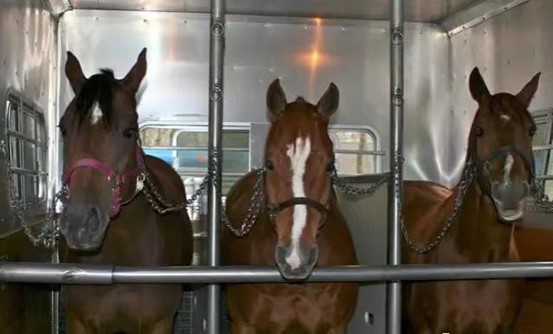

In recent years, with the rise of domestic horse industry, more and more horses are transported to various places for competition, breeding and trading. This is especially true internationally. Horses often travel between the two hemispheres, and various transportation routes such as land transportation, water transportation and air transportation have become very common. However, even short distance transportation has to pay some costs. Therefore, it is necessary to pay attention to health problems such as horse stress in horse transportation.

1. Pay enough attention to the concept
Transportation is not an ordinary pastime for horses. It can cause great stress to horses, especially for the first time. Moving from a familiar environment and being confined for several hours, surrounded by strange noise and constant shaking, some horses will have severe anxiety. Proper management and meeting the horse's needs for water and food will help alleviate stress related problems.
Horses should be in good health before transportation, needless to say, because they may encounter various conditions on the way. Stress will inhibit the immune system and cause sub-health or disease soon after arrival.

It is very important to be in good health when you arrive, especially the participating horses and mares that need breeding. In case of delay or accidents on the way, horses should not be deprived of water and food needs, and their nutritional needs should be fully met.
2. Supplement of water and forage
Water is the most important nutrient, as there are many horses that get dehydrated quickly.
A 500 kg horse needs roughly 19-23 liters of water per day, and lactating horses may need up to 1.5 times that. Horses eat forages: hay, low-moisture silage, alfalfa grass, and cut-short hay that require additional water to support the breakdown of fiber in the hindgut segment. Many horses sweat a lot during transport and these lost fluids need to be replaced. The effects of dehydration are to cause decreased cardiac output, reduced plasma volume, slow exchange of nutrients and slow elimination of waste products, all of which can have a detrimental effect on the horse. Although in practice an unlimited supply of water is more difficult, water is supplied at least every 4 hours.
For those horses competing, it is unwise to limit water intake on the day of transport, as the adverse effects of dehydration (described above) can be detrimental to the performance of the sport horse. Fresh, clean, water between 7 and 24°C is ideal. Some horses may refuse to drink water, but thirst tolerance is a key influence. Offering soaked grass helps to take in some of the water, or you can pour some water into the grass pockets at intervals. Most horses that refuse to drink usually do gradually drink again, but water must be provided in small amounts during the backhaul.
3.3. Horses lose weight
All horses lose weight during transport. The main reasons for this are reduced intake of food and water, and loss of water from the body.
The degree of weight loss is influenced by a number of factors, such as distance, food and water intake, and ambient temperature. Japanese studies have shown that a horse will lose 0.5% of its weight per hour in transit, and after more than 60 hours, up to 5% under extreme conditions.

Horses are typically transported over 30 hours, and rapid weight loss leads to a reduction in aerobic work capacity, so it is not advisable to start participating in major events. At the same time, anaerobic capacity and muscular endurance are also reduced. Transport weight loss can take up to 3 days to recover from, and this time should be taken into account for horses competing.
4.4. Transport distance and length issues
For transport lengths of less than 3 hours, the horse will consume less feed during transport than it normally would in the stall, and lack of food will not cause problems. For longer than three hours, the lack of food for an extended period of time can be harmful, and the lack of food and dehydration is a great risk for abdominal pain, as well as rapid fatigue from running out of energy to maintain standing balance.
Even for short hauls, hay or semi-dry grass should be available in a mesh pocket for the entire trip. The horse can also be offered cut, soaked forage, soaked, low-starch self-mix, or a palatable, low-starch, vitamin- and mineral-rich finished product.

Feeding even very small amounts of fiber can help with intestinal health. Measures to restrict feed and grass during transport can increase the risk of acid corrosion of the gastric mucosa. A small amount of short-cut alfalfa grass will not affect athletic performance and may in fact help. When the horse arrives at its destination and calms down, it can be fed some of the concentrate it normally eats. Electrolytes should also be supplemented to make up for the portion lost in sweat, and breeding mares are included.
Long hauls can certainly cause stress, and some supplementation at the right time may be beneficial. Weanling foals from mares on the same farm were transported under the same conditions for 36 hours, and those given vitamin C and vitamin E within 5 days of arrival overwhelmingly remained healthy without shipping fever. However, 80% of the group that did not supplement with VC and VE showed typical signs of shipping fever. Current researchers recommend 10 g of vitamin C daily for adult horses and 5 g of vitamin C daily for weanlings, which should be supplemented before and during transport.
The stress caused by long-distance transport in many horses can be mitigated by attention to detail. If nutrition is adequate during transport, then weight loss and dehydration will be less severe and the body condition will be better for the competing horse. Restrictions on water and food on race day can be detrimental, especially for those horses that are transported long distances to compete.